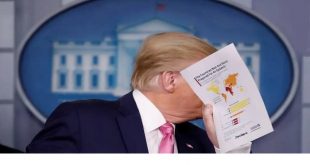Over the past week, the recently appointed U.S. ambassador to Germany, Ric Grenell, has been in the news for all the wrong reasons. On June 3, Breitbartpublished an interview with Grenell, in which he said: “There are a lot of conservatives throughout Europe who have contacted me to say they are feeling there is a resurgence going on. I absolutely want to empower other conservatives throughout Europe, other leaders. I think there is a groundswell of conservative policies that are taking hold because of the failed policies of the left.”
Grenell is early in his tenure, and may yet turn things around. But the Breitbartepisode is a symptom of a broader problem. With rogue ambassadors, a president who praises Vladimir Putin, a bureaucracy that supports nato, and an ongoing trade war, nobody really understands Trump’s policy on Europe
Enter Wess Mitchell, the U.S. assistant secretary of state for Europe, who laid out the administration’s long-anticipated Europe strategy in a speech at the Heritage Foundation on Tuesday. Mitchell, a well-regarded expert on central and eastern Europe, is the author of three books on foreign policy, including a forthcoming history of the Hapsburg Empire. The main message of his thoughtful, well-written, and strategic speech: The United States views Europe through the lens of a strategic competition between Western civilization and a Russian and Chinese alternative. Mitchell effectively announced a pivot in America’s Europe policy away from western Europe and toward the East (his natural stomping ground) and the South. In fact, Mitchell criticized western Europe for failing to take strategic competition seriously, particularly on defense spending and confronting Iran.
One would have to go back to the Suez Crisis of 1956 to find a time when the special relationship with Britain was in worse shape, for instance. Rhetorically, the Trump administration supports Brexit. In practice, it has pursued a predatory policy in response to Brexit, designed to exploit the government’s need for new trading arrangements. Essentially, the Trump administration is using Britain’s need to join the World Trade Organization as an individual state to force it to accept painful concessions in a number of trade and services sectors, exploiting the fact that it has less leverage outside the EU. Meanwhile, in bilateral trade talks, the Trump administration is pushing Britain to accept the U.S. regulatory framework, or at least opt out of the EU single market and customs union. This will benefit U.S. economic interests in the short term, but make it much tougher for London to reach an agreement with the rest of the EU.
The Trump administration, then, is treating Britain as an easy mark, not as a vital strategic ally. The State Department has been entirely absent from this part of the relationship, with the Commerce Department and the U.S. Trade Representative running point. Meanwhile, Trump has routinely offended the British people, retweeting a member of the British Nationalist Party and criticizing the mayor of London for failing to prevent terrorist attacks. All this makes it more likely that Jeremy Corbyn, an avowed critic of the United States and nato, will win the next election, plunging U.S.-British relations into further crisis.
On the surface, the relationship with France appears to be in better shape. However, the sweeping nature of Trump’s withdrawal from the Iran nuclear deal and his imposition of tariffs on steel and aluminum meant that President Emmanuel Macron got absolutely nothing for supporting Trump. Instead, France is now reassessing its policy toward America, asking if support means its national interests will be ignored and whether it needs to find and exploit sources of leverage.
Beyond the big three, the Trump administration has radically changed the U.S. position on European integration. In private briefings, multiple Trump administration officials have said they are adopting a new approach to the EU. Past administrations, they believe, have been too supportive of European integration, which has turned out to be a source of instability, they believe. The Trump administration would let Europeans make their own decisions. Yet the president has commented repeatedly on their politics, while Ambassador Grenell actively intervenes in their domestic debates and the Commerce Department tries to influence Brexit negotiations. Even setting all that aside, the shift in policy toward the EU is clear. At best, the United States is neutral; viewed less charitably, it is hostile.
American conservatives are inherently skeptical of the EU because they are ferociously protective of their own sovereignty and find it hard to imagine why anyone would choose to pool their own with that of others. This is nothing new. But previous Republican administrations were still broadly supportive of European integration. The Trump administration’s shift appears to have occurred without much consideration of its impact on vital U.S. interests.
For instance, an overwhelming majority of economists, including those who opposed the creation of the euro, believe that the breakup of the euro zone could precipitate an international financial crisis more severe than the Great Recession. If a debtor country were to leave, its banks would collapse and it would fall into deep economic crisis since its debts would be denominated in euros. But its assets would be in its new currency, which would likely have depreciated dramatically. This contagion would spread through Europe and then across the world, likely leading to additional financial collapse. The United States needs the euro zone to succeed because it cannot tolerate its failure—this is why the Obama administration engaged in quiet but sustained diplomacy to prevent a Greek exit. No one in the Trump administration has explained how the United States could cope with a euro zone collapse.
The United States cannot be strategically competitive in Europe without deepening its relationship with western Europe. Mitchell’s warning, that criticism without engagement risks estrangement and that the United States must win the hearts and minds of generations who have forgotten 1989, applies there too. The Trump administration would do well to cast aside ideological debates about the nature of sovereignty and instead focus on protecting America’s strategic interests in all of Europe—preventing the disorderly collapse of the euro zone, countering negative Chinese influence in Europe, ensuring that Europe and the United States work together to maintain an edge in new technologies, facilitating a smooth and negotiated Brexit, and preparing nato for political and information warfare.
On June 5, 1947, George Marshall gave the commencement address at Harvard University announcing the Marshall Plan to bolster the war-ravaged economies of Europe. At the Heritage Foundation yesterday, Mitchell did not mention the anniversary and instead said that economics and trade were the purview of other departments and that State would only “play a supporting role.” The legacy of Marshall, Dean Acheson, and George Shultz, all former secretaries of state who understood the importance of foreign economic policy, was cast aside. But what was true then—that economics and geopolitics are inextricably linked—is even truer in today’s globalized world. An economically savvy State Department could build a common transatlantic front to negotiate with China from a position of strength. But, with its key western European alliances in disrepair and no positive economic agenda, the Trump administration’s Europe strategy still does not take geopolitical competition seriously enough.
Source: www. theatlantic. com/international/archive/2018/06/trump-is-choosing-eastern-europe
 Tehran Institute For International Studies tiis
Tehran Institute For International Studies tiis



